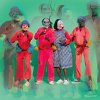Records blow me away for all sorts of reasons. Typically, the effect has something to do with its greatness — the sheer quality of the production, the producer’s mastery and execution of a particular genre (or awesome disregard for its conventions), the immaculateness of its composition, etc. But “quality” occasionally has very little to do with why I’m taken by records. Many of my favorites tend to defy ideas I thought I had about music. As I play such 12″s or LPs for the first time, I find myself scrambling to find my grounding as a critic — some precedent for what I’m hearing, some source of comparison, even something as tiny as a common tempo or synthesizer. This exasperation eventually leads to a kind of acceptance: it reaffirms that music is way, way bigger than I am and will always be a good fifty miles ahead of where I think it is. I lean back, crank up the volume, and let a sweet, sweet sonic ass kicking commence.
This was, in a nutshell, what happened when I first made contact with Shangaan music, as envisioned by self-described musical juggernaut Nozinja. He took a traditional style and both digitized it and, in the process, accentuated its rhythmic intricacies and compositional complexity. The Limpopo-based head of Nozinja Music Productions recently had his greatest hits from 2006-2009 lovingly compiled by a couple of record store-owning Marks — Ainley, of Honest Jon’s in London, and Ernestus, of Berlin’s Hard Wax — on Shangaan Electro: New Wave Dance Music From South Africa, and the music contained therein seems destined to cause unrest amongst their usual clients. South Africa has a relatively high-profile history with house, and Shangaan certainly feels like dance music. But by exceeding drum-and-bass tempos by a good fifteen beats per minute, not to mention eschewing the usual (or at least this critic’s) definition of high production values, Shangaan has very little to do with the dance music most of us in house and techno come in contact with. This is admittedly a naïve and perhaps narrow, Western-centric viewpoint, and I’ll make no claims to be an ethnomusicologist or apologies for not being a student of (South) African music. I can come at Shangaan Electro only as someone who follows dance music releases obsessively, and from this vantage, I’m making one of the oddest yet most enthusiastic recommendations I’ve made as a music writer.
Shangaan Electro is essential, though there’s a solid chance you’ll chuck this thing out the window moments after the needle drops, and that’s entirely understandable: track after track packed sardine-like with heinous organ presets — think Fever Ray, had Karin Dreijer Andersson and her collaborators tossed their sample bank in a pressure cooker — may prove insurmountable for a wide swath of dance fans. (A cellist friend of mine who’s studied world music somewhat extensively, usually enthusiastic about what I play her, thought this some kind of cruel joke, and I’m convinced this record will finally send my long-suffering roommate packing.) But for me, these twelve tracks are wonders of intricacy and juxtaposition, and they positively slam across four Dubplates & Mastering-cut sides. Where dubstep and techno find weight in sub-bass and repetition, respectively, Shangaan’s heft derives from so many forceful lines converging and narrowly escaping collision. It’s as if Nozinja’s strongman programming is all that’s keeping these superheated musical particles from spinning completely out of control. Listen to Shangaan Electro, and “Footcrab” and its trendy ilk sound quaint, if not positively slow-mo.
This music makes for an exhausting listen (and judging by the videos on Honest Jon’s web page devoted to the compilation, an astoundingly athletic dance), yet the vocal stylings of the Nozinja’s stable of artists soften the gut-punch considerably. The singers, from the Tshetsha Boys on “Nwampfundla (Pfundla’s Daughter)” to Tiyiselani Vomaseve on “Naxaniseka (I’m Suffering)” and Zinja Hlungwani on “N’wagezani, My Love (Gezani’s Daughter, My Love),” sound exhausted and weighed down, yet strong and resolved. “Shangaan music is about love. It’s about a wife and a husband,” Nozinja writes in the liner notes, and indeed, the deeply personal feel of the songs and the beauty of the singers’ delivery feels like it hails from a different planet than the instrumentals. I’m not sure the end result is pretty, exactly, but it’s strangely powerful and fly-on-the-wall intimate.
To those quick to dismiss Shangaan Electro, I’d recommend spending more time with the music than you think possible: as I’ve played nonstop at my house, I’ve heard cultural and stylistic barriers crumble and some truly invigorating music emerge. With the exception of the house-friendly “Vanghoma” from Tiyiselani Vomaseve, these tracks probably won’t work their way into any house, techno, or even future-bass DJ sets, but they’re potent reminders that dance music happens well beyond the scope of even its most dedicated students and can still defy our expectations of what electronic production makes possible. During the hottest summer in recent memory, Shangaan Electro certainly won’t help anyone sweat less, but I can’t think of a record sweeter, wilder, and more mindblowing to spend it jamming to.

















How do you know if a record is good? When you can’t figure out why it exists. That’s how I feel about this record.
I love this record so much. At first it was a bit off-putting, but the more I listen the more I dig it.
well written thoughtful review. kudos!
love shangaan. i first came across this on youtube while looking for videos of highlife bands playing. the dancing is incredible and the music too.
Interesting sounds.
Nice blog post, thank you. Those that don’t understand the music need to watch this:
http://www.youtube.com/watch?v=S3yzslfWjVk
i love the tsonga music,its so diffrent. im also a shangaan our music is hot, its big in ma province.
[…] Shangaan Electro: New Wave Dance Music From South Africa […]